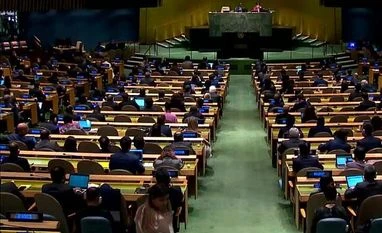UN General Assembly votes against US' economic, trade embargo against Cuba
The resolution is titled the "necessity of ending the economic, commercial and financial embargo imposed by the United States of America against Cuba"
)
Photo: ANI | Representative Image
Listen to This Article
The UN General Assembly on Thursday voted by a large margin against the US' economic and trade embargo against Cuba, first imposed in 1960, as per a report on the UN's official website.
A total of 187 states voted for the resolution put forward each year against the embargo with only the US and Israel voting against and Ukraine abstaining.
The resolution is titled the "necessity of ending the economic, commercial and financial embargo imposed by the United States of America against Cuba".
The UN General Assembly voiced concern that despite its resolutions dating back to 1992 (Resolution 47/19), "the economic, commercial and financial embargo against Cuba is still in place", and that "the adverse effects of such measures is on the Cuban people and on Cuban nationals living in other countries".
The UN recalled measures adopted by then-US President Barack Obama in 2015 and 2016 "to modify several aspects of the application of the embargo which contrast with the measures applied since 2017 to reinforce its implementation", as per the UN.
Also Read
The General Assembly reiterated its call for all states to refrain from promulgating and applying such restrictive laws and measures, in line with their obligations under the UN Charter and international law.
US Representative Paul Folmsbee said while explaining the vote, that his country "stands resolutely" with the Cuban people.
"We strongly support their pursuit of a future with respect for human rights and fundamental freedoms," he said, noting that sanctions are "one set of tools" in the US' broader effort towards encouraging Cuba to advance democracy and promote respect for human rights and fundamental freedoms.
He said the US recognizes the challenges the Cuban people face, explaining that sanctions include exemptions and authorizations relating to exports of food, medicines, and other humanitarian goods to Cuba, as per the UN.
"The US opposes this resolution," he said, encouraging the General Assembly to urge the Cuban Government to adhere to its human rights obligations "and listen to the Cuban people and their aspirations to determine their own future.
(Only the headline and picture of this report may have been reworked by the Business Standard staff; the rest of the content is auto-generated from a syndicated feed.)
More From This Section
Don't miss the most important news and views of the day. Get them on our Telegram channel
First Published: Nov 03 2023 | 7:39 PM IST


